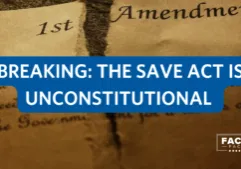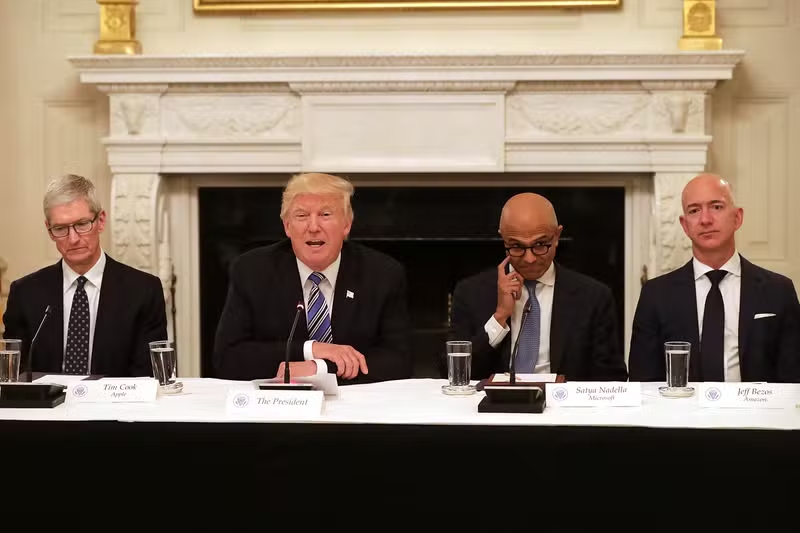Updated on Apr 11, 2025
The Save Act is Unconstitutional and Here’s How

6
VERIFIED SOURCES
This memorandum evaluates the constitutionality of H.R. 22, the “Safeguard American Voter Eligibility Act” (SAVE Act), which amends the National Voter Registration Act of 1993 to require documentary proof of U.S. citizenship for registration to vote in federal elections.
I. Summary of Key Provisions
- Requires documentary proof of citizenship (e.g., passport, REAL ID, birth certificate) to register to vote in federal elections.
- Applies to all forms of registration including mail-in forms, DMV registration, and Election Day registration.
- Mandates removal of non-citizens from voter rolls based on federal and state data.
- Establishes criminal penalties for officials who register voters without proper documentation.
- Expands inter-agency data sharing for verification.
II. Constitutional Concerns
A. Elections Clause & Supremacy Clause Conflicts
Relevant Law: U.S. Const. art. I, § 4; Supremacy Clause (art. VI).
Concern: H.R. 22 overrides federal registration standards previously upheld in Arizona v. Inter Tribal Council of Ariz., Inc., 570 U.S. 1 (2013). That decision ruled that Arizona could not require additional documentation beyond the federal form unless approved by the Election Assistance Commission.
B. Equal Protection (14th Amendment)
Concern: Disproportionately burdens certain classes of voters, including:
- Natural-born citizens without standard documentation
- Elderly, rural, Native American, and low-income individuals
- Citizens born abroad or outside hospitals Such burdens may be unconstitutional under Crawford v. Marion County Election Bd., 553 U.S. 181 (2008), which upheld ID laws only where the burden was minimal and exemptions existed.
C. Due Process (5th & 14th Amendments)
Concern: The bill allows removal from voter rolls based on unverifiable or disputed information without guaranteed notice or opportunity for hearing. This likely violates procedural due process requirements outlined in Mathews v. Eldridge, 424 U.S. 319 (1976).
D. First Amendment (Chilling Effect)
Concern: Criminalizing mistakes by election officials and restricting registration activities could chill voter outreach efforts, infringing on political speech and association rights.
E. Americans with Disabilities Act (ADA) Compliance
Concern: In-person documentation requirements lack sufficient accommodations for individuals with disabilities, potentially violating the ADA and related constitutional protections.
III. Constitutionally Permissible Aspects
- Congress has authority under the Elections Clause to regulate federal elections.
- Limiting voting to U.S. citizens is constitutional (see Sugarman v. Dougall, 413 U.S. 634 (1973)).
- Providing states access to federal databases for verification is permissible if due process is preserved.
IV. Conclusion While Congress has the authority to regulate voter registration for federal elections, H.R. 22 contains provisions that likely conflict with the U.S. Constitution as interpreted by the Supreme Court. Specifically:
- It overrides existing federal registration processes without satisfying the requirements of the Supremacy Clause.
- It imposes undue burdens on certain voters, violating Equal Protection principles.
- It fails to provide adequate due process for voter removal.
- It may suppress legitimate political activity in violation of First Amendment rights.
Facts work the best when shared with friends. ..
SOURCES
- H.R.22 – SAVE Act
- U.S. Const. art. I, § 4; Supremacy Clause (art. VI).The Constitution of the United States
- Arizona v. Inter Tribal Council of Ariz., Inc., 570 U.S. 1 (2013)
- Crawford v. Marion County Election Bd., 553 U.S. 181 (2008)
- Mathews v. Eldridge, 424 U.S. 319 (1976)
- Sugarman v. Dougall, 413 U.S. 634 (1973)

FactPAC is dedicated to supporting a robust and fair Democracy by getting the facts to voters. FactPAC is an unconnected political action committee that has no affiliation with any other organizations or campaigns. We are donor-supported and volunteer-run.


























